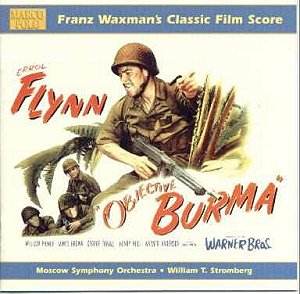| **************************************************************
EDITOR’s RECOMMENDATION November
2000
************************************************************** |
Franz
WAXMAN
Objective Burma
 Moscow Symphony Orchestra
conducted by William T Stromberg
Moscow Symphony Orchestra
conducted by William T Stromberg
 MARCO POLO 8.225148
[71:38]
MARCO POLO 8.225148
[71:38]
Crotchet
Amazon
USA

The versatile Franz Waxman won a deserved Academy Award nomination for this
gritty, heroic score. I remember all the fuss this excellent and unusually
restrained war film made on its showing here in the UK. Listening to this
music, I wonder if it more than Errol Flynn, in one of his finest, understated
roles, was to blame for inflaming British veterans emotions and ire? But
I jest. Certainly this score reflects the spirit of the times; the film was
made in 1945. It is very gung-ho; but it is also correspondingly down-beat
for much of the screenplay as the paratroopers' luck runs out and everything
looks bleak as the Japanese close in and rescue aircraft continue to miss
spotting them
Charles Gerhardt in his Classic film Scores series for RCA recorded a brilliantly
thrilling reading of 'Parachute Drop' from Objective Burma! as part of the
'Captain Blood - Classic Film Scores for Errol Flynn' album (GD80912). This
same episode on this new album may not have quite that impact but it is that
much more accurately reconstructed and played so that Waxman's intentions
are splendidly realised. He said, "…the sequence …where the
paratroopers jump from the plane to pursue their mission…the music must
be descriptive in character. The zig-zag figurations in the violins more
or less characterise the jerky, abrupt movements of a man who is jumping
from a plane. The hundreds of bodies floating in the air descending in different
directions gave inspiration for this violin figuration. Later the main theme
joins in unison, and after everybody is safely on the ground, this same thematic
material is developed in fugato played ponticello pianissimo by the strings
until the end of the sequence."
The opening 'Main Title - Opening Scene - Briefing in an Hour' introduces
all the major themes. A huge gong followed by statements of the Burma theme
suggest the exotic locale (although Waxman wisely eschews the use of
clichés of the pentatonic scale, temple bells and wood blocks). Trumpet
flourishes set the military atmosphere and a persistent drum roll, incorporated
in the 'Shock' theme presages dangers to come. But it is the Paratroopers
March that impresses. This march will pass through a series of mutations
as the screenplay unfolds. At the start of the operation it is all swagger,
confidence and optimism. After successful completion of the mission but during
the danger-filled retreat to base the March becomes less defiant, more trudging
but determined, then as things worsen it becomes ever more despondent. Nervous
and edgy material insinuates its way into 'Take off - in the Plane' as the
paratroopers anticipate their mission.
The Moscow players are responding more and more effectively to Stromberg
and Morgan's direction as this Marco Polo Film Music series progresses. Witness
the virtuoso string playing in, for instance, 'Killing the Sentry-Getting
Ready' when they play swiftly moving staccato agitated material, and blocks
of plucked figures (rather like rows of soldiers) -- every hair-line thin
note is razor sharp.
It is a tribute to Waxman's immense skill how he can create so much tension
and suspense using single solo instruments, a block or a xylophone, or with
a quiet string tremor. Similarly he can create a jungle picture with just
a solo woodwind twittering or a droll elephantine figure on the brass (offering
much needed comic relief). His score magnificently, sensitively, touches
all the heroism and tragedy of Flynn's weary, besieged soldiers, their emotions
descending from jubilation to disappointment, to disillusion, to despair.
He also vividly paints the off-stage brutality of the Japanese. One of the
most affecting moments in the score is the quiet, moving elegy for the journalist
Williams. Impressive too are 'The Invasion - the Landing' as reinforcements
and rescuing troops arrive at last the closing with a muted yet still optimistic
restatement of the main title music and a reprise of the parachute jumping
music. In the concluding 'The Camp-Finale', the music underlines the soldiers
sense of weariness and relief, while the sound of taps mournfully commemorates
those that have fallen.
The notes in the 32 page booklet are exemplary, well up to what we have come
to expect in this series with articles covering not only a track-by-track
analysis but also 'The Making of Objective Burma!' and a description, by
Rudy Behlmer of the score from which I lifted the quote from Franz Waxman
above, and a portrait of the film's director Raoul Walsh. The point is well
made that the story of Objective Burma! was practically wholly transposed
to the 19th century and to the Second Seminole War in Florida in another
Warner Bros film starring Gary Cooper, Distant Drums (1951) for which Max
Steiner contributed another magnificent score. (A recording of this score
was reviewed on this site last year). It is interesting to compare Steiner's
music with this terrific Waxman opus.
Now, Mr Morgan, after this success, what about a new complete recording of
Waxman's The Spirit of St Louis and The Nun's Story? Excellent.
Ian Lace

![]()
![]()
![]()
![]()
![]()
![]()
![]()
![]()
![]()
![]()
![]()
![]()
![]()
![]()
![]()
![]()